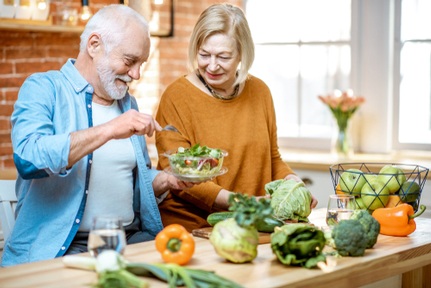Podcast: Charity boss calls it 'shocking' as diets of older vegetarians and vegans in care homes ignored
The chief of Vegetarian for Life says it is “absolutely shocking” that some care homes are still misunderstanding or ignoring the fact that some of their residents pursued meat free lifestyles before coming to the home.

The charity VfL which works with care homes on how to cater for vegetarians and vegans in their care, recently released a report with the All-Party Parliamentary Group (APPG) on Vegetarianism and Veganism, revealing examples of basic failings in care homes and hospitals when it comes to protecting the human rights of meat-free patients receiving care.
MP Christina Rees, chair of the APPG called the failures “deeply upsetting” and “clearly unacceptable”.
Amanda Woodvine, chief executive of VfL, shared her views on the report on the Let’s Talk About Care podcast, saying: “It is absolutely shocking and it is why we exist as a charity”.
Vegetarian for Life was set up back in 2007 by trustees shocked by the story of an elderly woman who had been an animal’s rights campaigner and was vegetarian. When she went into a care home after developing dementia, she was given food containing meat, with staff claiming they felt it was acceptable because she ‘would not know any different’.
In a similar case, a few years ago, the daughter of a woman with dementia at a care home in Wales, took her complaint to the Public Services Ombudsman for Wales, after finding she was regularly fed meat despite being vegetarian.
'There's still a lot of training to be done'
“There is still a lot of training to be done about the importance of beliefs and how you can actually meet someone’s nutritional beliefs without meat or dairy.
“When the resident has a lucid moment and realises what has happened, they might be really upset as they have felt so strongly about this belief” and this has affected their “menu choices for so many decades," says Ms Woodvine.
There are just over 300,000 older vegetarians and vegans in the UK and one in four care homes has at least one or more residents that are vegetarian or vegan, according to VfL.
VfL has an online directory of care homes, with one in six care homes in the UK being a member of VfL and “these have all pledged to cater well and ethically for older vegetarians and vegans”.
It also offers care caterer training online or inhouse as well as help with menu planning.
VfL has seen a growth in older people embracing meat free diets, partly due to the price of meat and for health reasons. Yet despite this rise, there are still only two care homes in the UK which offer purely vegetarian food.
Big rise in number of vegans in care homes
The rise has been particularly high among vegans, with the number of vegans living in residential care having gone up by 167 per cent in the five year period between the last time the data was gathered, according to Ms Woodvine.
This push towards veganism in the general populace has led to more care homes coming on board and offering more diverse dishes.
“We are slowly getting there. Care homes that are working with us are absolutely seeking to improve their range.”
The charity is asking care homes to sign up to a Memory Care Pledge to help ensure vegetarians or vegans who have capacity issues, or cognitive losses, are offered choice of meals, drinks and snacks that uphold their ethical beliefs.
“For many people, it is their most important belief. All individuals have a right to varied and nutritious meals, and respect for their previously held beliefs and cultural norms,” says Ms Woodvine.
The charity recommends that people going into a care home make sure they fill in an advanced care plan to ensure their chosen diet is respected and not compromised.
For more information on VfL and to see which care homes offer vegetarian and vegan food, go to www.vegetarianforlife.org.uk
To listen to all of the podcast with Amanda Woodvine click here
Latest News
 29-Jul-24
Dementia Bus gives carehome.co.uk staff insight into life with dementia
29-Jul-24
Dementia Bus gives carehome.co.uk staff insight into life with dementia
 01-Mar-24
Find out the top care homes in 2024
01-Mar-24
Find out the top care homes in 2024
 21-Mar-23
UK's top care homes in 2023 revealed
21-Mar-23
UK's top care homes in 2023 revealed
 03-Jan-23
carehome.co.uk launches free care helpline
03-Jan-23
carehome.co.uk launches free care helpline
 13-Dec-22
5 mins with Emily Whitehurst, chief operating officer for Constantia Healthcare
13-Dec-22
5 mins with Emily Whitehurst, chief operating officer for Constantia Healthcare